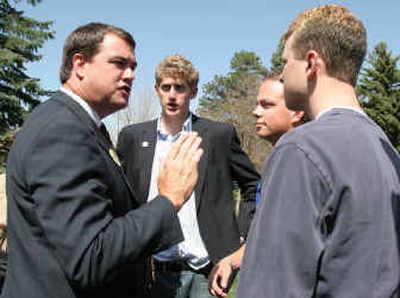Bohn picked to tidy mess

BOULDER, Colo. – Normally, the university president or chancellor gets the honor of introducing a new athletic director to the public. At Colorado, though, the chancellor is gone and the president is a lame duck.
That’s the situation Mike Bohn walked into Wednesday, hired to lead a department savaged by troubles that have played a major role in the departures of Bohn’s predecessor, Dick Tharp, chancellor Richard Byyny and president Betsy Hoffman, who will leave by June 30.
“The University of Colorado is a diamond that needs a little polishing,” Bohn said after being introduced by interim chancellor Phil DiStefano.
The former San Diego State A.D. held his 30-minute news conference outdoors, on campus, a symbolic display of his intent to bring sports back to the students and fans at a school that has grown increasingly alienated by trouble within the football program run by coach Gary Barnett.
With Hoffman on her way out, DiStefano has been at the forefront of this search. He made it clear that Bohn would be the man in charge, with final say on hiring and firing of coaches. That was hardly a given after the university reshaped roles following the sex-and-recruiting scandal that engulfed the football program with allegations, most of which have not led to legal or NCAA sanctions.
Bohn, in turn, made it clear that Barnett will remain the football coach at CU.
“Gary’s our coach and I’m looking forward to working with him and all the coaches,” Bohn said. “I expect him to be the great leader football coaches are supposed to be.”
The 44-year-old Boulder native said he has met with Barnett and discussed the issues facing Colorado as it tries to reestablish respect it has lost over the last several years.
Barnett described it as a good meeting.
“We got to know each other, got to find out that we’re on the same page,” he said. “We all want this to go in the right direction.”
Bohn is used to rebuilding. He comes to CU after an 18-month stint at San Diego State, helping put that program back together after years of declining revenue, morale and corporate support. Before that, Bohn spent five years at the University of Idaho and oversaw a similarly challenging overhaul.
“We had him in mind early on,” said Chuck Neinas, a consultant who helped with the search. “We were impressed with Mike from the beginning. It is a perfect match.”
Neinas was Bohn’s boss more than a decade ago when both were at the College Football Association.
At Colorado, Bohn’s top goal is to win back the fans and boosters, many of whom left the program, upset over plans to increase ticket prices for a program that has been sinking, both on and off the field, in many minds.
“We’ve got to be more user-friendly,” said Bohn, who wore “Go Buffs” and “I (Heart) CU” buttons on his black blazer. “We’ve got some terrific things in place, some outstanding coaches and student-athletes who need to be supported.”
DiStefano said he was recommending to the Board of Regents a five-year contract for Bohn worth $250,000 a year with incentives that could add up to $100,000 a year more. The regents are expected to approve Bohn’s hiring at an April 27-28 meeting.
Bohn was one of three candidates Colorado interviewed – DiStefano wouldn’t reveal the names of the other candidates – and he won out because of his “integrity, dedication, his personal track record,” DiStefano said.
This is a homecoming for Bohn, who grew up in Boulder, played football, basketball and baseball at Boulder High and whose mother still lives in town.
He has worked in athletics at the state’s two other major Division-I programs, Air Force and Colorado State. He was athletic director at Idaho from 1999-2003 and had the same job at San Diego State for 18 months before accepting the position at CU.
He said the lure of coming home was too strong to turn down. He is just the school’s sixth athletic director, replacing Tharp, who resigned under pressure last year.
While acknowledging the enormous task ahead, Bohn said he did not want to be viewed strictly as someone who was coming in to clean house.
“The staff through this process is a little beaten down,” Bohn said. “But I’m going to meet with them, say ‘C’mon, let’s go to work,’ and let’s have that great attitude we know we can have.”